冠词数词介词专题整理
语法专题01 冠词、介词、连词、代词、数词

a “u”, a university, a useful animal, a used car, a one-year-old baby, a European
an “f, h, l, m, n, r, s, x” an hour an honest boy
例题:There is ___D______ “m” and _____D______ “u” in the word much.
定冠词用于“世纪”的表达。如:in the 1980s 20世纪80年代
定冠词用于形容词和分词前表示一类人。如:
the rich富人the poor穷人the sick病人the blind盲人the old老人
the young年轻人the deaf聋子
the wealthy富人the disabled残疾人
连接各种状语从句的连词(when/while/if/unless/until/although/though/because/since/as等)
代词
1-3分
单项选择
完形填空
短文填空
人称代词主格和宾格;反身代词结合词组搭配;
形容词性物主代词和名词性物主代词;指示代词that/those;
it做形式主语和形式宾语的固定句型;复合不定代词;
who, whom, whose, what, which
不定代词
表示笼统指代,不能确定指代具体哪些人或物
much, little, some, any, none, neither, few, other, everything,someone, something, somebody等
关系代词
连接定语从句的代词
☞【真题回顾】
中考语法:名词、代词、冠词、数词和介词

第一讲名词一、名词的定义名词是表示人、事、物、地点以及抽象概念的词。
二、名词的分类(一)专有名词和普通名词名词根据其意义分为普通名词和专有名词1、专有名词是表示特定的人或事物名称的词。
如:Peter, Snow White, Sunday, April,Christmas Day, China, Changsha, the Great Wall, the WTO, West Street...2、凡不属于特定的人或事物的名称的词,叫普通名词。
如:desk, book , people, air, interest,idea...(二)可数名词和不可数名词名词根据是否能够用数字来计算,可以分为可数名词和不可数名词。
1、可数名词复数的变化规则a.一般情况下,直接加-s,如:book-books, bag-bags, cat-cats, bed-beds ;b.以s. x. sh. ch结尾,加-es,如:bus-buses, box-boxes, brush-brushes,watch-watches;c.以“辅音字母+y”结尾,变y为i,再加-es,如:family-families, city-cities ;d.以“f或fe”结尾,变f或fe为v,再加-es,如:wife- wives, knife-knives,wolf -wolves, leaf-leaves ;e.以“o”结尾的词,分两种情况1)__________+es 如:mango-mangoes tomato-tomatoes hero-heroes2) ___________+s 如:photo-photos radio-radiosf. 不规则名词复数:man-men, woman-women, policeman-policemen,policewoman-policewomen, snowman-snowmen, child-children, foot-feet,tooth-teeth, mouse-mice, goose-geese单复数同形:fish-fish deer -deer sheep -sheep people(人们)-people Chinese-Chinese Japanese-Japanese(中日不变英法变,其余后面加s)Englishman-____________________, Frenchman-_________________Russian=_____________________ American-__________________2、复合名词变复数boy student-boy students man doctor-men doctors3、不可数名词◆不可数名词没有复数形式,如:tea,,meat.◆不可数名词不可以被基数词和不定冠词(a/an)直接修饰,若要表示数量,就得在数词和不可数名词之间加上“量词+of”。
介词的用法区别、冠词、数词、名词、形容词、动词
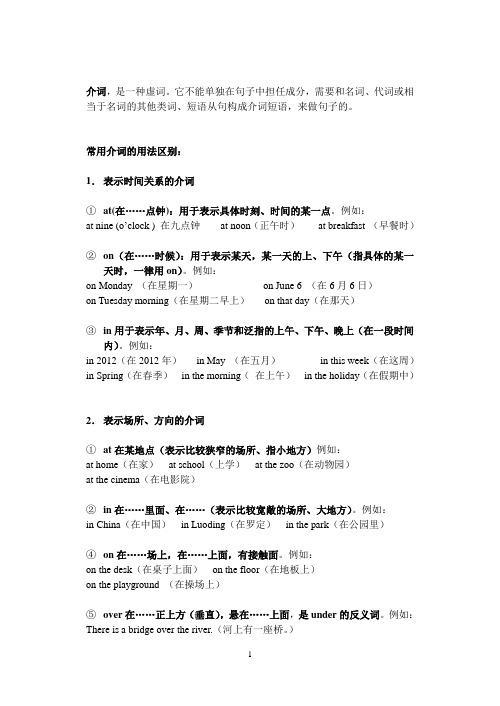
介词,是一种虚词。
它不能单独在句子中担任成分,需要和名词、代词或相当于名词的其他类词、短语从句构成介词短语,来做句子的。
常用介词的用法区别:1.表示时间关系的介词①at(在……点钟):用于表示具体时刻、时间的某一点。
例如:at nine (o’clock ) 在九点钟at noon(正午时)at breakfast (早餐时)②on(在……时候):用于表示某天,某一天的上、下午(指具体的某一天时,一律用on)。
例如:on Monday (在星期一)on June 6 (在6月6日)on Tuesday morning(在星期二早上)on that day(在那天)③in用于表示年、月、周、季节和泛指的上午、下午、晚上(在一段时间内)。
例如:in 2012(在2012年)in May (在五月)in this week(在这周)in Spring(在春季)in the morning(在上午)in the holiday(在假期中)2.表示场所、方向的介词①at在某地点(表示比较狭窄的场所、指小地方)例如:at home(在家)at school(上学)at the zoo(在动物园)at the cinema(在电影院)②in在……里面、在……(表示比较宽敞的场所、大地方)。
例如:in China(在中国)in Luoding(在罗定)in the park(在公园里)④on在……场上,在……上面,有接触面。
例如:on the desk(在桌子上面)on the floor(在地板上)on the playground (在操场上)⑤over在……正上方(垂直),悬在……上面,是under的反义词。
例如:There is a bridge over the river.(河上有一座桥。
)冠词、数词冠词要用在名词前面,用来说明名词所指的人或事物是泛指还是特指。
冠词是一种虚词,不能单独作句子成分。
冠词分为不定冠词a/an和定冠词the。
(word完整版)名词,冠词,数词,代词,介词

名词名词的数1、可数名词与不可数名词A、不可数名词,初中阶段常见的不可数名词有:water ; meat ; rice ; bread ; milk ; tea ; orange (桔汁) ; fruit ; air ; snow ; chalk; work ; paper(纸) ; time(时间); music ; weather ; grass ; news ; food ; fish(鱼肉); coke ; porridge ; cake(可数或不可数). 不可数名词应注意以下几点:1)前无数、冠,后无复数;作主语为三单。
2)表量用约数some /any ; much ; a lot of 或用of短语eg。
There is ____ bread on the table。
[C]A. aB. one C。
a piece of D. manyThere is some_______ on the plate. [B]A. apple B。
fish C. milks D. deer2、可数名词的复数A、不规则变化:man—men ; woman—women ;child—childrenpoliceman—policemenEnglishman—EnglishmenFrenchman—Frenchmenfoot—feet ; tooth—teeth mouse(鼠)—miceB、规则变化1)s; sh; ch; x 结尾加 es 读[iz]2) ce; se; ze; (d)ge 结尾加 seg. boxes [b ksiz] blouses [blauziz]3)f (fe) 结尾则变f(fe)为v加es——-读[vz]eg. knives [naivz]4)“辅+y”结尾变y为i加es 清就清[s]5)一般加s 浊就浊[z]eg。
books[buks] pens[penz] babies[beibiz]但注意以下几点:① potato—potatoes ; tomato—tomatoes②单复同形: fish ; sheep ; deer ; Chinese ; Japanese③由man , woman在词首构成的复合名词应将两部分都变成复数man doctor - men doctors④ reef—reefs⑤“某国人"的复数:中日不变英法变,其余s加后面。
名词、代词、数词、冠词、介词、连词
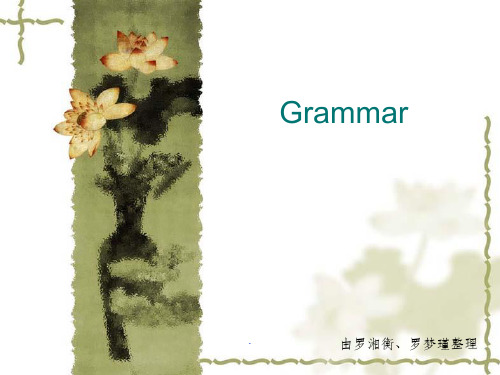
.
人称代词
人称代词(Personal pronouns)在指称 上的特殊性:
it 指代婴儿;she, her常指称轮船、汽车和国家;we, you 有时可泛指一般人;one 有时做单数人称代词, 有时可泛指人们。如:
❖ The distance light travels in one second is somewhere about 300,000 kilometers.
❖ 试用不同短语翻译:大约有7000名学生参加了会议。
.
不定数目的表示法
2. 用and 或or 连接两个相邻的并列数词。如: ❖ The students came into the classroom by twos
• When the repairs had been done, she was a fine and beautiful ship. • We eat to live, not live to eat. • One has to think of the practical side of things.
.
可数名词有单、复数之分。可数名词的复数形 式有以下几种:
情况
加法
例词
一般情况
以s, x, ch, sh结尾的词
加-s 加-es
以辅音+y结尾的词 去y加-ies
以辅音+o 结尾的词 多数加-es
brothers;schools buses;watches;dishes*1 ladies; countries*2 heroes;tomatoes*3
2025年中考英语专题复习名词、数词、冠词、介词+课件

语 法 串 讲 (1)
a/an hour
a/an umbrella
a/an husband
a/an child
冠词
语法考频:★★
基础必备
2.不定冠词:a/an; an hour /ən ˈaʊə(r)/
语 法 串 讲 (1)
an umbrella /ən ʌmˈbrelə/ a husband /ə ˈhʌzbənd/
(1)
冠词
语法考频:★
语
【习题】You can prepare French fries on the sand in ____ Sahara on a sunny day.
法
串
A./
B.a
C.the
D.that
讲
(1)
冠词
语法考频:★
语
【习题】You can prepare French fries on the sand in ____ Sahara on a sunny day.
数词
语法考频:★
【易混小语点】 “基数词+连字符+名词”可构成复合形容词,此时名词要用单数形式,相
语 法 串 讲 (1)
当于“数词+复数名词的所有格”。
【例】a ten-minute walk / ten minutes’ walk 十分钟的路程
a two-year-old girl / a two years’ old girl 两岁大的小女孩
名词
语法考频:★
语
【习题】My husband accompanied me to a ____ clothes department to buy a
法
串
名词、代词、数词、冠词、介词、连词概要

❖ 试用不同短语翻译:大约有7000名学生参加了会议。
不定数目的表示法
2. 用and 或or 连接两个相邻的并列数词。如: ❖ The students came into the classroom by twos
E.g. the first, the best , in the south
❖ 4)在复数姓氏前加the,表示××一家人,常看成复 数;
E.g. the Browns, the Whites
❖ China has a population of approximately 1.3 billion.
❖ An estimated 50,000 books are kept in our library.
❖ She looks to be in the neighborhood of 50.
❖ 一些专有名词 eg: Eskimos; Filipinos
❖ ②以f/fe结尾只加-s的词:
❖ proofs;gulfs; cliffs; roofs; beliefs; chiefs
❖ ③一些希腊或拉丁外来语的复数。如:
❖ analysis—analyses
❖ basis—bases
❖ medium—media
❖ The house in which we live is not large.
❖ Everything that can be done has been done. ❖ ③ 其他关系代词:as可用作关系代词,但它主要用于
名词、代词、数词、冠词、介词、连词

❖ I hate people who/ that talk much but do little.
❖ I’m looking at the photograph which/ that you sent me with your letter.
❖ Everything that can be done has been done.
只有复数形式的情况: trousers(裤子); glasses(眼镜); compasses(圆规) thanks; clothes; remains; goods; people; cattle
a pair of
有些名词可以兼作可数名词和不可数名词。
glass ( 玻璃 )
a glass ( 玻璃杯 )
3.2 基数词
❖ 基数词一般可写成如345或three hundred and forty-five。基数词一般是单数形式,但 遇下列情况,常用复数:
1. 与of 短语连用,表示概数,不能与具体数目连用, 如scores of people 指许多人。
2. 在一些表示"一排"或"一组"的词组里。例如:They arrived in twos and threes. 他们三三两两的到了。
copper ( 铜 )
a copper ( 铜币/板 )
tin ( 锡 )
a tin ( 罐头 )
paper ( 纸 )
a paper ( 报纸,证件,论文 )
iron (铁 )
an iron (熨斗 )
wood ( 木头 )
a wood ( 树林 )
gold (金子 )
a gold (金牌 )
youth (青春 )
冠词、数词、介词
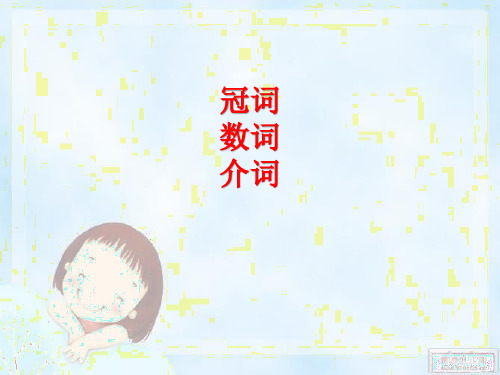
5.球类,棋类,语言,三餐,游戏名称、西 洋乐器和颜色前不加冠词。如: • I like to play basketball. • We have lunch at school. 6.在表示家庭成员名称,称呼语,表示头衔 或职务的名词前不加冠词。 This is Doctor. Li.(博士)
数词
考点 1.分数和百分数 2.基数词和序数词 3.月份和年代的表达
基数词
1~99 百位数 千位数以上 从数字的右端向左端数起,每三位数加一个“,” 前的数字后添加thousand, 第二个“,”前的 数字添加billion。然后一节一节分别表示,两 个逗号之间最大的数为百位数形式。 2,648 two thousand six hundred and forty-eight 16,250,064 sixteen million two hundred and fifty thousand sixty-four
3. 表示差几点几分,差多少分钟到60分钟 +to+下一个时刻 8:50 ten to nine 19:45 a quarter to twenty
世纪、年代和年月日表达法
1.世纪可以用定冠词加序数词加世纪century 表示,也可以用定冠词加百位进数加’s表示 The sixth(6th) century 公元6世纪 The eighteenth(18th) century 公元18世纪 The 1900’s 20世纪 The 1600’s 17世纪
基数词在表示确切的数字时, 不能使用百、千、百万、十亿的复数形式; 但是,当基数词表示不确切数字, 如成百、成千上万、三三两两时,基数词 则以复数形式出现。如: There are hundreds of people in the hall. Thousands and thousands of people come to visit the Museum of Qin Terra-Cotta Warriors and Horses every day.(秦陵兵马俑博物馆) They went to the theatre in twos and threes. (三三两两)
中考英语总复习之名词、冠词、代词、数词、连词、介词、形容词和副词

中考英语总复习之名词、冠词、代词、数词、连词、介词、形容词和副词【专项训练】1、We found very difficult to learn Japanese.A.this B.that C.it D.its2、Her parents went there with a friend of.A.they B.themselves C.them D.theirs3、I asked him for some oil,but he hadn’t.A.some B.any C.anything D.no4、of the four roads will take you the hospital.A.Neither B.Either C.Both D.Any5、I have five colour pencils,one is red,another is blue and three are green.A.the other B.other C.the others D.others6、of us would agree with you.A.Someone B.No one C.None D.Nobody7、Did you break windows?A.both of B.both the C.either of D.the both8、of you would like to go with me?A.Which B.What C.Any D.Who9、has passed the examination.A.Every of us B.All of us C.Every one of us D.Each of us10、There is a line of trees on side of the street.A.every B.both C.any D.each名词()1.The children had_______in the park.A.good timesB.good timeC.the good timeD.a good time ()2.I am busy with my work these days.I don’t get_______.A.many sleepB.much sleepC.more sleepD.most sleep ()3.This is an interesting_______.A.newsrmationC.workD.job()4.Her parents are_______.A.EnglishB.AmericaC.FrenchmanD.two English()5.Room110on the second floor is the_____office.I know some of them.A.doctorsB.doctor’sC.doctors’D.doctors’s()6.The room is_______.They are brothers.A.Tom and Mike’sB.Tom’s and Mike’sC.Tom’s and MikeD.Tom and Mike()7.The box is made of a kind of hard_______.A.woodenB.woodC.woodsD.word()8.Can you see some_______on the hill?A.sheeps and deersB.sheeps and deerC.sheep and deersD.sheep and deer()9.How many_______shall we pay for the special service?A.moneyB.yuansC.dollarsD.pound()10.I have many friends here.Lily is_______.A.mine friendB.a friend of myC.one of myD.one of them()11.---Would you like some_______?---Thank you,but I am not hungry.A.breadsB.cakesC.orangesD.orange juice()12.Don’t make any_______,the boy is sleeping.A.voiceB.noiseC.musicugh()13.She was born in Xiangfan,but now she works in Taiyuan.So we cannot say Taiyuan is her_______.A.hometownB.second homeC.familyD.house()14.Is this your_______for making so many mistakes?A.ideaB.mindC.excuseD.result()15.There are few_____for supper.Would you please buy some carrots and cabbages on your way home?A.meatB.eggsC.fruitD.vegetables()16.---Would you like some_______?---Oh,yes,just a little please.A.pearsB.applesC.bananask()17.---Can you finish the work in a week?---No_______.A.problemB.matterC.troubleD.question()18.Is there a little_______left for me?A.roomB.placeC.groundD.house()19.The sign“_______!”is often seen on the box.A.NO PHOTOSB.NO SMOKINGC.BUSINESS HOURSD.THIS SIDE UP ()20.Help yourselves to some_______,children.A.fishB.fishesC.a piece of fishD.a fish()21.---Here is the_______,please.---Oh.Fried meat with some green peppers and two eggs.A.billB.listC.bookD.menu()22._______is used to eat soup.A.KnifeB.ForkC.SpoonD.Chopsticks()23.---What’s the_______like today?---It’s sunny.A.climateB.weatherC.skyD.space()24.Two thirds are_______in our school.A.woman teachersB.women teachersC.woman doctorD.women doctors()25.It’s_______walk from my home to our school.A.two minutes’B.two minute’sC.two minutesD.two-minutes’冠词()26.This is_______English-Chinese dictionary.A.aB.anC.oneD./()27.Let’s ask_______man under the tree.A.aB.anC.theD./()28.There is_______university in our town.A.aB.anC.theD./()29.Do you have_______aunt or uncle?A.aB.anC.theD./()30.We are going to have_____supper with_____Greens tomorrow evening.A.a,theB.the,theC./,/D./,the()31.We all should be kind to_______old.A.aB.anC.theD./()32.Chongqing is______biggest city in our country.A.aB.anC.theD./()33.I often stay at_______home to do some reading at_____weekends.A.the,theB./,/C.the,/D./,the()34.What_______bad weather it is today!A.aB.anC.theD./()35.It’s_______Women’s Day today.A.aB.anC.theD./()36.My brother likes to play_______basketball while I like to play_______ violin.A./,/B.the,theC.the,/D./,the()37.They spent half_______hour finishing doing_______work.A.a,aB.an,anC.an,theD.the,a()38._______horse is_______useful animal.A.A,aB.The,anC.A,theD.A,an()39.She has_______eraser.It’s_______orange.A.a,aB.an,anC.an,/D./,an()40.Our English teacher has been in______hospital for two days.Let’s go to see her today.A.aB.anC.theD./()41.---You’ve got___e-mail address,haven’t you?---Yes.It’s___ ***************.A.a,/B.an,/C.the,aD./,an()42.This is_____empty glass.Would you please give me_____full one?A.a,anB.an,aC.the,aD.an,the()43.---When shall we hand in the exercise-books?---_____sooner,_____ better.A.A,aB.A,theC.The,aD.The,the()44._______United States and China are two of______biggest countries in the world.A./,theB.The,theC.The,/D./,/()45.I’ve never seen_______interesting film.A.such anB.a suchC.an suchD.such a()46.---Are you_______German or American?---German.But I have lived in America.A.aB.anC.theD./()47.He had tried twice,and the teacher asked him to have____third try.A.aB.anC.theD./()48.There’s_______“u”and_______“s”in_______word“use”.A.an,a,theB.a,a,aC.a,an,theD.the,the,the ()49.There is____tall tree in____front of our classroom.A.a,/B.a,theC.the,theD./,/()50.He wanted to hit me on____nose.A.aB.anC.theD./代词()51.The weather in summer in Wuhan is hotter than_______in Beijing.A.oneB.itC.thatD.this()52.---How do you think about the film?---Sorry._______of us have seen it.A.SomeB.AnyC.AllD.None()53.---Which do you like better,English or Chinese?---_______.I prefer math.A.EitherB.NeitherC.BothD.No one()54.---What would you like to drink?---It doesn’t matter._______will do.A.SomethingB.NothingC.EverythingD.Anything()55.---Shall we meet on Saturday or Sunday?---_______day is OK.A.AnyB.EitherC.EachD.Every()56.---Is this your book?---No,_______is in my bag.Perhaps it’s_______.A.my,herB.mine,hersC.mine,herD.my,hers()57.Mr Wang taught_______English last term.A.weC.ourD.ours()58.I have two brothers._______is a doctor,______is a soldier.A.One,the otherB.One,otherC.The one,the otherD.The one,other()59.His mother did the housework all by_______.A.herB.sheC.hersD.herself()60.This pair of trousers is too short.Would you please show me_______one.A.otherB.othersC.anotherD.the others()61.Is there_______in today’s newspaper?A.new anythingB.anything newC.new somethingD.new everything ()62.I found_______important to read English in the morning.A.itB.thatC.itsD.which()63.---____are you going to visit in Beijing?---We are going to visit the Summer Palace.A.WhereB.WhatC.WhyD.When()64.He wanted to invite three of_______---Tom,Mike and_______to his birthday party.A.we,I,me,ID.we,me()65.They are twins._______of them like English.A.EachB.BothC.AllD.Neither()66.Your son is old enough to look after_______.You needn’t worry about _______.A.him,himB.himself,himselfC.himself,himD.him,himself ()67.My father keeps some white cows and three black_______.A.oneB.onesC.itD.its()68.The desks in our classroom are bigger than_______in yours.A.themB.thoseC.onesD.that()69.---_______are you?---Ah,it’s a secret.A.HowB.How manyC.How muchD.How old()70._______sister asks_______to go to school with_______.A.My,I,sheB.My,me,herC.I,my,sheD.I,me,her ()71.---Do you have_______CDs here?---Yes,they are over there.---May I borrow_______?---Yes,of course.A.some,someB.any,anyC.any,littleD.some,any ()72.They all lost_______in the beautiful music.A.themB.theirC.theirsD.themselves()73.Your computer is very different_______.A.to meB.from mineC.for mineD.as me()74.He wants to know_______ask about Father Christmas.A.to whoB.to whomC.whose toD.whom to()75.---Is that Miss Li speaking?---Yes,this is Miss Li speaking._______?A.Who are youB.Who is heC.Who is sheD.Who is that 数词()76.Tuesday is the_______day of a week in English.A.firstB.fifthC.thirdD.fourth()77.There are_______seasons in a year in our country.A.twoB.fourC.secondD.fourth()78.The game of_______Olympics will be held in Beijing in2008.A.29B.the29thC.the29D.29th()79.Most of the stars are much more bigger than the sun.But they are______ light years away from us.A.thousandB.thousandsC.thousand ofD.thousands of ()80._______of the surface(表面)of the earth is covered with water.A.First thirdB.Two thirdsC.One threeD.Two three ()81.There are_______people in my family.We live on the_______floor in a tall building.A.five,sixB.fifth,sixthC.fifth,sixD.five,sixth ()82.Boys and girls,we are going to learn_______today.A.Four LessonB.the fourth lessonC.the Lesson FourD. the Four Lesson()83.My lovely daughter is_______.A.eight years oldB.eight-year-oldC.eight year oldD. eight-years-old()84.The flood happened_______.A.in the summer of1998B.in the summer of1998sC.in1998of the summerD.in1998s of the summer()85.February28should be read as_______.A.February of the28thB.February of28C.28of FebruaryD.the28th of February()86.---How soon will you finish your work?---In about_______.A.one and a half monthB.one month and a halfC.one and half a monthD.a month and half()87.We will have a_______holiday.What about going to Suzhou?A.five daysB.five dayC.five-dayD.five-days()88.We are sure the_______century will bring us more hopes.A.twentieth-firstB.twentieth-oneC.twenty-oneD. twenty-first()89.---What is1/2and1/3?---It’s_______.A.2/5B.1/5C.5/6D.4/6()90.At the age of_______,he had his own lab.A.thirtyB.thirtiethC.the thirtiethD.the thirty ()91.Five times five is_______.A.fiveB.zeroC.tenD.twenty-five()92._______are in the army.A.Two their sonsB.Their two sonsC.Their sons twoD.Two sons their ()93.My sister is a student of_______.A.the First ClassB.Class OneC.One ClassD.Class First ()94.The boy can count from one to_______.A.hundredB.a hundredC.one hundredsD.hundreds()95.Their house is about_______as big as ours.A.times threeB.three timeC.time threeD.three times ()96.---Would you like some fruit,madam?---Oh,yes._______,please.A.5kilo bananasB.5kilos of bananasC.5kilo of bananasD.5kilos of banana()97.This building is for a_______.A.family of threeB.three peopleC.three peoples familyD.three people’s family()98.Ten and five is_______.A.fiveB.fiftyC.fifteenD.two()99.There are_______in a day.A.24hoursB.12hoursC.four hoursD.365hours ()100.Tom wants to buy a hamburger,a large coke and an ice-cream.How much? Hamburger$2.60Orange juice$1.20Hot dog$2.15Coffee$1.50Ice-cream $2.00Water$0.50Popcorn$1.00Large coke$1.00A.Three dollars and sixty cents.B.Five dollars and thirty-five cents.C.Five dollars and sixty cents.D.Two dollars.连词1、I don’t like reading watching TV.What about you?“I don’t like reading all day,I like watching TV plays.”A.and,but B.and,and C.or,and D.or,but2、You won’t know the value(价值)of the health you lose it.A.untilB.afterC.when D.because3、We bought Granny a present,she didn’t like it.A.butB.andC.orD.so4、Study hard,you will pass the exam.A.so B.for C.but D.and5、Put on more clothes,you’ll catch cold.A.and B.for C.or D.but6、My shoes are worn out,I need new ones.A.so B.if C.because D.and7、He ran fast he won the race.A.enough…to B.so…that C.too…to D.both…and8、He is only ten months.He can read write.A.either…or B.neither…nor C.both…and D.so…that9、She said she might come Saturday Sunday.A.neither…nor B.nither…or C.too…to D.so…that 10、If Tom Mike asks for their car,tell him to come tomorrow.A.or B.and C.with D.but11、It was already ten o’clock we got to the museum this morning.A.that B.when C.if D.for12、It’s a long time we met last.A.so B.after C.since D.before13、That maths problem is difficult nobody can do it.A.too…to B.very…that C.so…that D.very…but 14、I’ll give her the message she comes back.A.since B.before C.until D.as soon as15、the teacher came into the classroom,many students were talking to each other.A.While B.If C.Since D.When16、People often mistake us for each other we are twins.A.if B.when C.because D.after17、Could you tell me in your home town in winter?A.if it often snowed B.whether does it often snowC.if it often snow D.whether it often snows18、Are you sure Mr.Li will come to your birthday party?A.if B.that C.for D.when19、Lily Lucy like singing.A.Either…or B.Beither…nor…C.Both…and D.So…that20、Read the sentences slowly we can understand what you read.A.so that B.before C.until D.because介词()61.Miss White looks_______her mother.She is good-looking,too.A.afterB.forC.likeD.at()62.---When will Mrs Smith come to Shanghai?---_______March 5.A.OnB.ToC.AtD.In()63.---When did you begin to learn English?---_______2001.A.SinceB.AtC.InD.From()64.--Do you like English films?--Yes.I was told that there would be an English film____the evening of September1st.A.inB.onC.atD.to()65.---What are you doing?---I’m writing my talk_______tomorrow.A.onB.byC.toD.for()66.---Who are the boys_______green shirts?---Oh,they are the fansA.withB.inC.atD.from()67.---Does his uncle live in London?---Yes,he has lived there_____two years ago.A.fromB.inC.beforeD.since()68.---Is the old bridge made_______wood?---Yes,it is.A.inB.ofC.fromD.into()69.My uncle has just bought a house____a small garden___front of it.A.with;inB.of;atC.near;byD.in;on()70.---Can you make a sentence_____the word“produce”?---OK.Let me have a try.A.inB.byC.withD.at()71.---What kind of tea do you like?---I like Chinese tea_____nothing______ it.A.with;inB.in;onC.on;withD.for;at()72.---Where does the boy usually have breakfast?---He usually has it____ home.A.onB.fromC.inD.at()73.---Look!The farmers are still working____the heavy rain.---Oh.Let’s them.A.withB.inC.underD.without()74.---Why did the woman look unhappy?---Because she felt worried_____her sick baby.A.forB.toC.onD.about()75.We won the game by5_______ 3.A.toB.byC.overD.on()76.---How long have you been_______this school?---Two years.A.toB.forC.ofD.in()77.---I think that waste paper and bottles should be collected_______ recycling.---I agree_______you.A.by;forB.as;atC.for;withD.from;as()78.---What are they doing,dad?---They are putting up a picture____the front wall.A.onB.atC.inD.over()79.---Do you know the student_______David and Jeff?---Yeah.It’s Jim.A.amongB.inC.betweenD.around()80._____an English-Chinese dictionary,the word“sing”comes___the word “king”.A.On;beforeB.For;amongC.At;betweenD.In;after()81.The thief got in_______the window.A.throughB.acrossC.overD.after()82.---I’m not good_______remembering names.---Neither am I.A.inB.onC.atD.with()83.Thanks_______our teacher,we solve the problem_______her help.A.for;withoutB.to;withC.for;withD.to;without ()84.Now many children like surfing_______the Internet,but_______the same time they should know that there is something unhealthy on it.A.for;inB.at;byC.on;atD.in;on()85.It’s very nice_______you to take care______my baby while I was away.A.for;ofB.to;forC.with;afterD.of;of()86.Nobody can stop me_______working hard_______English.A.for;inB.on;forC.from;atD.in;on()87.These American scientists arrived_______Guangzhou late_______night.A.on;atB.in;atC.in;inD.at;in()88.---Does your grandfather often read newspapers____breakfast?---Yes, he does.A.onB.inC.atD.of()89.It’s my turn to be_______duty today.I have to go to school early.A.forB.onC.inD.of()90.There will be many shoes_____this Sunday.I’ll go and buy a pair_____ my daughter.A.on show;forB.on foot;toC.on watch;fromD.on business;at ()91.---How many English songs have you learned this term?---_______10.A.At allB.At onceC.At timesD.At least()92.---Look,mum!I got the first prize_______the physics competition yesterday.---Congratulations!I am very_______what you’ve done.A.on;angry withB.in;pleased withC.at;afraid ofD.for;sorry for()93.---Please retell the story_______English.---OK.A.withB.byC.inD.at()94.Sichuan is one of the largest provinces___China.It’s__the southwest of China.A.on;atB.in;inC.at;toD.to;from()95.---I’m looking forward_______taking a holiday in Hainan.---So am I.It’s great to be_______holiday there.A.for;onB.to;atC.to;onD.for;at()96.---What did Mary have_______breakfast this morning?---She was late for school and hurried off_______it.A.for;withoutB.at;withoutC.for;afterD.at;after ()97.---Excuse me,could you tell me the way to the People’s Hospital?---Walk along this street_______and you’ll find it.A.in the endB.to the endC.by the endD.at the end ()98.---Did he go to school_______his bike yesterday?---No,he went _______foot.A.by;onB.in;byC.on;onD.by;by()99.---What time is it,please?---It is seven_______my watch.A.inB.atC.onD.by()100.-What can you see?-a car running__the bridge and a ship sailing__ it.A.across;underB.over;underC.above;throughD.over;through()1.---Mum,the Chinese medicine tastes so______that I don’t want to take it.---But,dear,it is good for you.A.goodB.terriblyC.terribleD.well()2.---I think we should keep_______in the reading-room.---You are right.A.quietB.quietlyC.quiteD.quickly()3.---How was the old woman this morning?---She looked_______.A.be happyB.happilyC.happyD.to be happily()4.Travelling by train is_______cheaper and_______enjoyable than by air.A.more;much moreB.quite;much tooC.very;very muchD.much;far more()5.Oct.15th was one of_______days in2003.Shenzhou V was sent up successfully.A.excitingB.more excitingC.the most excitingD.much exciting ()6.This kind of skirt looks_______and sells_______.A.nice;wellB.nice;goodC.well;wellD.good;nice ()7.Nothing in the world is_______if you set your mind to do it.A.impossibleB.wonderfulC.interestingD.necessary()8.If you like the chicken,you may have as_______as you can.A.moreB.manyC.littleD.much()9.---Uncle Wang is_______man that he always helps others.---Oh,he is really great.A.so friend aB.such a friendlyC.such friendly aD.so a friendly()10.---Many people like to read the book Business@the Speed of Thought.---That’s right.There’s_______in it.A.something interestingB.interesting somethingC.nothing interestingD.interesting nothing()11.---Mum,Bill is coming to dinner this evening.--OK.Let’s give him____ to eat.A.something differentB.different anythingC.anything differentD.different something()12.At9a.m.on October15,2003,_______Yang Liwei flew into space in the manned spaceship.A.38years oldB.38year oldC.38-year-oldD.38-years-old ()13.Music is as_______as sports among young people.A.more popularB.most popularC.popularD.so popular()14.This maths problem is_______that one.A.not so easy asB.more easy thanC.as easier asD.easy than()15.---Dad,could you buy me a computer like this?---Of course,we can buy_______one than this,but_______it.A.a better,better thanB.a popular,as good asC.a more popular,not as good asD.a cheaper,as good as()16.They have just cleaned the windows,so the room looks_______.A.much brighterB.more brightC.less brightD.more brighter ()17.Since China has been a member of WTO,English is_______useful than before.A.muchB.mostC.moreD.very()18.---What delicious cakes!---They would taste_______with butter.A.goodB.betterC.badD.worse()19.---Have you decided which you’d like to buy,the black skirt or the pink skirt?---Of the two,the pink one is_______.A.nicestB.the nicerC.niceD.very nicer()20.I don’t like this film.It’s_______that one.A.as interesting asB.less interesting asC.more interesting thanD.not so interesting as()21.---The coat is too expensive.---Don’t worry.Here’s another one.It’s nice and_______,I think.A.brightB.dearC.beautifulD.cheap()22.---Mum,I am_______.Can I have a coke?---Why not drink some water?A.thinB.coolC.thirstyD.hungry()23.---John’s dog died last week.That made him very_______.---Poor boy!He loved it so much.A.sadB.pleasedC.easyD.interesting()24.The population of China is_______than______of any other country in the world.rger;thatB.more;thatrger;the oneD.more;the one()25.Chongqing is bigger than_______in Sweden.A.any other cityB.all the other citiesC.any cityD.the other cities()26.---Look at the picture.How’s the weather?---It’s_______.A.sunnyB.windyC.wetD.warm()27.The2008Olympic Games will be held in Beijing,so____Chinese are learning English.A.the more and the moreB.fewer and fewerC.more and moreD.most and most()28.In the exam,the_______you are,the______mistakes you’ll make.A.carefully,littleB.more carefully,fewestC.more careful,fewerD.more careful,less()29.Everyone knows China is getting_______.A.strong and strongB.stronger and strongerC.more strong and strongD.strongest and strongest()30.---Which is_______,the sun,the moon or the earth?---Of course,the moon.A.smallB.smallerC.smallestD.the smallest()31.---That man is driving_______.We must stop him at once.---OK.Let’s call the police.A.carefulB.carefullyC.dangerousD.dangerously ()32.---How do you write with your new pen?---_______.A.Quickly and neatlyB.Quick and neatC.Quick and neatlyD.Quickly and neat()33._______,I went to the railway station to see my friend off.A.Before eating quickly my dinnerB.Before my quickly eating dinnerC.After eating my dinner quicklyD.After eating my quickly dinner ()34.Lots of visitors come to Shanghai because it is_______city.A.so a beautifulB.very a beautifulC.such beautifulD.quite a beautiful()35.It is_______to work out this problem.You needn’t go to ask the teacher.A.enough easyB.easily enoughC.easy enoughD.very easily ()36.---Can I carry it for you?---Well,I’m afraid the box is_______heavy for you,but thank you all the same.A.soB.muchC.veryD.too()37.---_______are you going during the summer holidays?---To the beach.A.WhenB.WhereC.HowD.Why()38.They all looked_______at the teacher and felt quite_______.A.sad;sadB.sadly;sadlyC.sad;sadlyD.sadly;sad ()39.Mike did not_______,so we couldn’t understand him.A.clear speakB.speak clearlyC.more clearly speakD.clearly spoke()40.---_______do you have an English party?---Once a month.A.How oldB.How farC.How oftenD.How long()41.---How far is it from your home to your school?---It’s a quarter’s walk,_______.A.here and thereB.now and thenC.up and downD.more or less()42.It is said that the workers in this factory are_______young people between the ages of twenty and twenty-five.A.mostB.almostC.mostlyD.at least()43.---It’s_______nice of you to help me.---That’s all right.A.trueB.trulyC.realD.really()44.---_______did Mr Green come to China?---To see his son,Jim.A.HowB.WhenC.WhyD.What()45.She always finishes her homework on time.She_______leaves it for the next day.A.alwaysB.neveruallyD.sometimes()46.Cathy did quite_______in the English competition,but Jenny did even _______.A.better;wellB.well;wellC.well;betterD.better;better()47.---_______will it take us to get there by bus?---About two hours.A.How soonB.How oftenC.How longD.How quick()48.It was_______late to catch a bus after the party,so we took a taxi.A.too veryB.much tooC.too muchD.far()49.The plane got back to the airport and landed_______.A.safeB.livelyC.safetyD.safely()50.You don’t need to go any_______,for the post office is near there.A.farB.fartherC.furthestD.farthest()51._______the young man is running!A.How fastB.How quickC.How fastlyD.What quickly()52.My sister is good at sports.She can jump_______than me.A.highestB.very highC.too highD.much higher()53.---_______will you finish the work?---In a week.A.How oftenB.How soonC.How longD.How far()54.---Has Mr White come_______?---Yes.He has_______been here for10minutes.A.yet;alreadyB.already;yetC.already;alreadyD.yet;yet()55.People speak_______of the film Not One Less(《一个都不能少》).It is really necessary for every child to go to school.A.loudB.loudlyC.highD.highly()56.It’s twelve o’clock at night,but Mr Zhang is_______working in the office.A.alreadyB.everC.stillD.yet()57.---_______are you going to have your birthday party?---You know,my birthday is on June23.On that day,of course.A.WhenB.WhereC.WhoD.How()58.Bob never does his homework_______Mary.He makes lots of mistakes.A.so careful asB.as carefully asC.carefully asD.as careful as()59._______you dive into the water,_______you breathe.A.Deeper;harderB.The deeper;the harderC.The deep;the hardD.Deep;hard()60.---Can you catch what I said?---Sorry,I can_______understand it.A.almostB.hardlyC.nearlyD.never【答案】:二、1、C2、D3、B4、D5、A6、C7、B8、A9、D10、DKey:1-5DBDAC6-10ABDCD11-15BBACD16-20DAADA21-25DCBBAKey:26-30BCABD31-35CCBDD36-40DCACD41-45BBDBA46-50DACACKey:51-55CDBDB56-60BBADC61-65BABBB66-70CBBDB71-75ADBDDKey:76-80CBBDB81-85DBAAD86-90BCDCA91-95DBBBD96-100BACAC【答案】:连词一、1、D2、A3、A4、D5、C6、A7、B8、B9、B10、A11、B12、C13、C14、D15、D16、C17、D18、B19、C20、A介词Key:61-65.CACBD66-70.BDBAC71-75.ADBDA。
名词代词冠词数词介词连词(讲义和练习)
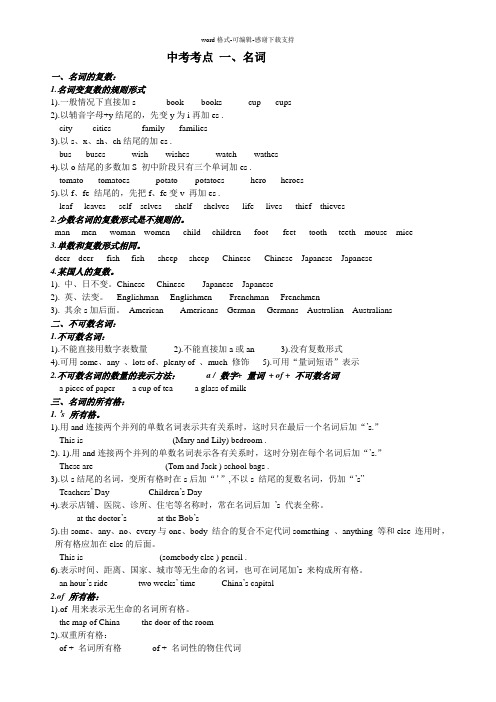
中考考点一、名词一、名词的复数:1.名词变复数的规则形式1).一般情况下直接加s book------books cup-----cups2).以辅音字母+y结尾的,先变y为i再加es .city-------cities family-----families3).以s、x、sh、ch结尾的加es .bus-----buses wish------wishes watch------wathes4).以o结尾的多数加S 初中阶段只有三个单词加es .tomato-----tomatoes potato------potatoes hero-----heroes5).以f、fe 结尾的,先把f、fe变v 再加es .leaf----leaves self---selves shelf----shelves life----lives thief---thieves2.少数名词的复数形式是不规则的。
man----men woman---women child----children foot-----feet tooth----teeth mouse---mice3.单数和复数形式相同。
deer---deer fish----fish sheep----sheep Chinese ----Chinese Japanese---Japanese4.某国人的复数。
1). 中、日不变。
Chinese----Chinese Japanese---Japanese2). 英、法变。
Englishman----Englishmen Frenchman----Frenchmen3). 其余s加后面。
American -----Americans German----Germans Australian---Australians二、不可数名词:1.不可数名词:1).不能直接用数字表数量2).不能直接加a或an 3).没有复数形式4).可用some、any 、lots of、plenty of 、much 修饰5).可用“量词短语”表示2.不可数名词的数量的表示方法: a / 数字+ 量词+ of + 不可数名词a piece of paper a cup of tea a glass of milk三、名词的所有格:1. ’s 所有格。
中考--冠词、数词、介词
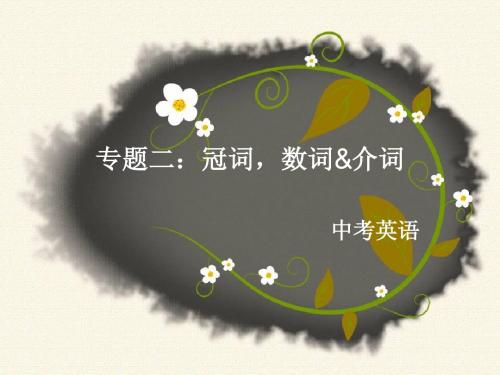
到底选a/an还是the
• the number of “...的数量”-----动词用单数 • a number of “很多...”------动词用复数 • 【2012红塔区抽测】It is reported that____n C umber of people in Yuxi is about 2,303,511. A.a B.an C.the D./
有些名词前用冠词或不用冠词,其意义有所不同 如:1)at table在吃饭; at the table在桌子旁 • 2)in class在上课; in the class在班级中 • 3)go to school去上学; go to the school到那所学校 • 4)go to bed上床睡觉; go to the bed到床那边去 • 5)in front of在…的前面 ; in the front of在…的前部
• the second time 第二次 • a second time 再一次
中考链接
1. She is too tired ,so she wants to have___ res A t A a B an C the 2. Foshan is a beautiful city .I’ll come here ___ A second time . A a B the C an 3.Mr. Wang bought ______ house .______ hous e is not far from the lake . C A. a ;An B. the;The C. a ;The 4. _____ Blacks are going to the parkthis Sunda y .Why don’t we go for _______ walk ? B A.A,a B.The,a C.The,the
高考英语二轮总复习 核心语法必备 专题四 冠词、代词和介词
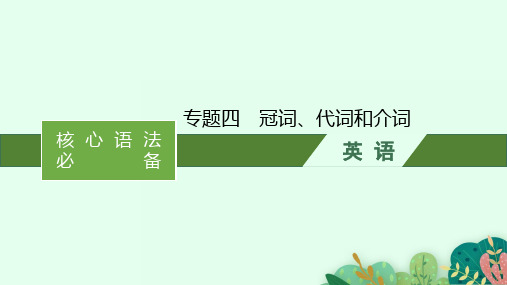
重点一
重点二
重点三
(7)It is/has been three years since he joined the army. 他参军三年了。
(8)It was three years before he returned home. 过了三年他才回家。
重点一
重点二
重点三
考点4 不定代词
1.other, others, the other/others, another
重点一
重点二
重点三
重点三
考点1 常见 介词的用法
介词
重点一
重点二
重点三
重点一
重点二
重点三
重点一
重点二
重点三
重点一
重点二
重点三
重点一
重点二
重点三
考点2 介词短语 1.at+名词 at a loss 不知所措 at dinner 在吃晚餐 at peace 处于和平状态 at war 在战争中 at work 在工作
It happens that...碰巧…… It occurs to/comes to/strikes/hits sb that... 某人突然想起……
It is said/reported/considered...that... 据说/据报道/认为……
It is certain that... ……是一定的。
(3)We finally made it to the airport though it was rainy. 尽管下雨, 但是我们最终及时赶到了机场。
重点一
重点二
重点三
(4)As someone puts it, practice makes perfect. 正如某人所说, 熟能生巧。 (5)Please see to it that you fasten the safety belt when driving. 开车时请确保系好安全带。 (6)I take it that you don't agree with the manager. 我想你不同意经理的意见。
英语冠词、介词知识总结
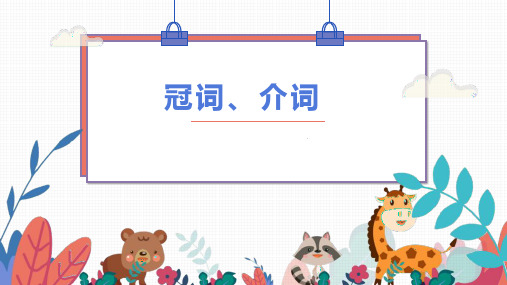
on purpose by chance catch/on fire at dawn/dusk face to face in debt make room for out of date heart and soul in danger in return day by day in place
As is known to us,Russia is a European country.
2. 不定冠词a/an放在单数可数名词前,泛指一个人或一个事物。 They found an apartment in America where they lived only half a year.
3. 表示泛指。说话人第一次提及某人或某物时通常用不定冠 词。
5. 用在表示计量的名词前,表示按…计算,如by the hour,by the day,by the week,by the dozen,by the yard等,但是如表示单位的 名词为不可数名词,之前不用冠词,如by weight/height等。
As far as I know, he will get paid by the week.
3. 有无冠词意义不同的搭配
at table在吃饭
at
the
table在桌子旁
in hospital住院
in
the
hospital在医院里
at school在上学
at
the
school在学校
in charge of掌管
in
the
charge
of在……掌管之中
out of question毫无疑问
out
in/after+时间段
在 …… 之 后 。 “in + 时 间 段 ” 常 与 将 来 时 连 用 ; “after+时间段”常与过去时连用
英语之中名词、代词、动词、形容词、冠词、数词、副词、介词、连词、感叹词.doc

(一)1、名词名词 (Nouns )是词性的一种,也是实词的一种,是指待人、物、事、时、地、情感、概念等实体或抽象事物的词。
名词可以独立成句。
在短语或句子中通常可以用代词来替代。
2、代词是代替名词的一种词类。
大多数代词具有名词和形容词的功能。
英语中的代词,按其意义、特征及在句中的作用分为:人称代词、物主代词、指示代词、自身代词、相互代词、疑问代词、关系代词和不定代词八种。
3、动词,就是用来形容或表示各类动作的词汇。
基本上每个完整的子句都有一个动词,要表示第二个动作时可使用不定词、动名词、对等连接词、从属连接词或增加子句等方法连结。
根据其在句中的功能,动词可分为四类。
4、形容词形容词【 adjective】很多语言中均有的主要词类中的一种。
主要用来修饰名词的词 , 表示事物的特征5、冠词的定义冠词是置于名词之前,对名词起限制作用的一种虚词。
冠词可以说是名词的一种标志,它不能离开名词而独立存在。
冠词的分类冠词分为不定冠词"a ,an" 、定冠词 "the" 和零冠词三种6、数词表示 " 多少 " 和" 第几 " 的词 , 叫数词。
其用法相当于名词或者形容词。
数词分为基数词和序数词两种。
表示数目多少或顺序多少的词叫数词,数词分为基数词和序数词。
7、副词 (Adverb) 副词的定义: 副词是一种用来修饰动词 , 形容词 , 副词或全句的词 , 说明时间 , 地点 , 程度 , 方式等概念。
8、介词的定义和特征介词是一种用来表示词与词, 词与句之间的关系的词。
在句中不能单独作句字成分。
介词后面一般有名词代词或相当于名词的其他词类,短语或从句作它的宾语。
(二)1、名词,人或事物的名称3、代词,代替名词或者数词(比如some就是代替数目)3、动词,动作或状态4、数词,表示数目或顺序(比如序数词,5th就是表示顺序)5、形容词,人或事物的性质或状态(因为形容词一般修饰名词)6、副词,动作的特征或性状特征(因为副词一般修饰动词或形容词)7、冠词,表示名词的泛指或特指8、介词,表示名词或代词与其他词的关系(因为介词后面一半紧跟名词,代词或其他名词性结构)9、连词,连接词与词,短语与短语,句子与句子10、感叹词,表示说话时的感情或语气(三)1、adj. / a.形容词用来描述一类物质的性质, 状态 , 外貌 ,或人的性格特点 , 性质 , 品格如:big,happy2、adv. / ad.副词用来修饰动作或形容词, 一般在句子中做状语用表示动作的进行怎样 , 或表示程度 , 特点 ,如:clearly,happily3、prep.介词连接地点 , 时间的一类词语 , 可以表示方位 , 时间 . 跟一些表示时间, 地点的词连用表示介词词组如:in,to,on,under4、conj.连词用来连接时间 , 地点 , 原因, 结果的一类词语如:when,beacuse,so5、num. 数词表示数字的词 , 既可以是基数词 , 也可以是序数词如:one,two,first6、int.感叹词表示感叹的一类词 , 一般不加一解释 , 只代表感叹如:what,how,haurray7、vt.及物动词(后面要加宾语)行为动作的词如:do,finish,play8、vi.不及物动词(后面不加宾语)表示行为动作的词如:appear9、n. 名词表示物体 , 物质的词如:pig,cow,man10、pron.代词代指一类人 , 事或物的词如:he,she,hers,his,things11、art =冠词,article的缩写(四)在英语语法中主要把词分为8 大类:1.名词:表示人、物或地方等,如:John,teacher ;table ,pen;London;beauty .2.代词:用来代替名词,以避免重复某个名词,如: I ,you,it ,that ,those ,them.3.形容词:用来修饰或限制某个(些)名词,如: good(man),white (paper ),every(book),much(water ),(John is )hon-est ,(He seems)lazy .被修饰或限制的名词,叫做主体词(head-word)。
名词、代词、数词、冠词、介词、连词

倍数的表示法
1. …times + noun / pronoun The earth is 49 times the size of the moon. 2. …times + as + adj./ adv. + as We have spent 3 times as much time on Project A
反身代词
❖ 反身代词说明动词的宾语或间接宾语与其主 语所指人或物相同,它一般不单独作主语。
❖ ① 反身代词的强调用法
❖ The engine itself is all right, but the light are badly damaged.
❖ ② 常接反身代词的动词
❖ behave oneself, blame oneself, defend oneself, absent oneself (from), avail oneself of (利用), pride oneself on(使得意)…
❖ The removal of books from this library is forbidden. It’s forbidden to remove books from this library.
❖ ③ 双重属格。
❖ 兼有两种属格结构的后置修饰语叫双重属格。双重属格 的特点有:
❖ A. of后面的名词必须指人,而且是特指的。
❖ He ate a whole chicken ! ❖ Would you like some chicken ? ❖ 又如:a glass玻璃杯/ glass玻璃 ❖ a wood 一片树林 / wood 木头、木材
可数名词有单、复数之分。可数名词的复数形 式有以下几种:
中考英语《冠词、数词、介词与连词》考点详解
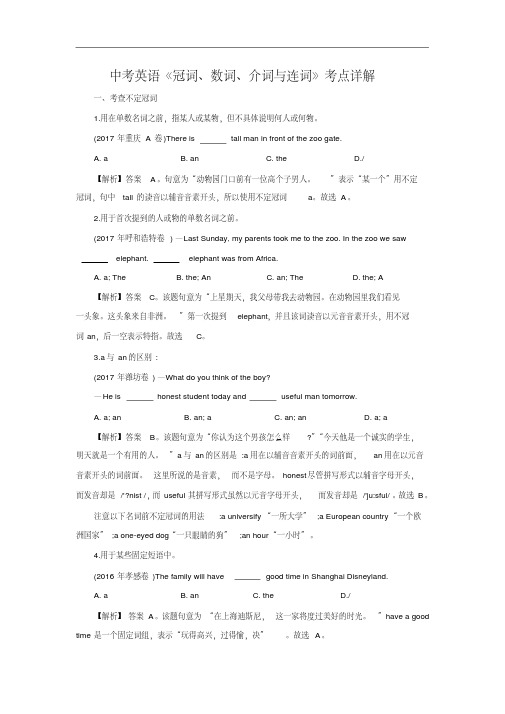
中考英语《冠词、数词、介词与连词》考点详解一、考查不定冠词1.用在单数名词之前,指某人或某物,但不具体说明何人或何物。
(2017年重庆A卷)There is tall man in front of the zoo gate.A. aB. anC. theD./【解析】答案A。
句意为“动物园门口前有一位高个子男人。
”表示“某一个”用不定冠词,句中tall的读音以辅音音素开头,所以使用不定冠词a。
故选A。
2.用于首次提到的人或物的单数名词之前。
(2017年呼和浩特卷)—Last Sunday, my parents took me to the zoo. In the zoo we saw elephant. elephant was from Africa.A. a; TheB. the; AnC. an; TheD. the; A【解析】答案C。
该题句意为“上星期天,我父母带我去动物园。
在动物园里我们看见一头象。
这头象来自非洲。
”第一次提到elephant,并且该词读音以元音音素开头,用不冠词an,后一空表示特指。
故选C。
3.a与an的区别:(2017年潍坊卷)—What do you think of the boy?—He is honest student today and useful man tomorrow.A. a; anB. an; aC. an; anD. a; a【解析】答案B。
该题句意为“你认为这个男孩怎么样?”“今天他是一个诚实的学生,明天就是一个有用的人。
”a与an的区别是:a用在以辅音音素开头的词前面,an用在以元音音素开头的词前面。
这里所说的是音素,而不是字母。
honest尽管拼写形式以辅音字母开头,而发音却是/'?nist /,而useful其拼写形式虽然以元音字母开头,而发音却是/'ju:sful/。
故选B。
注意以下名词前不定冠词的用法:a universify“一所大学”;a European country“一个欧洲国家”;a one-eyed dog“一只眼睛的狗”;an hour“一小时”。
中考冠词和介词专题2
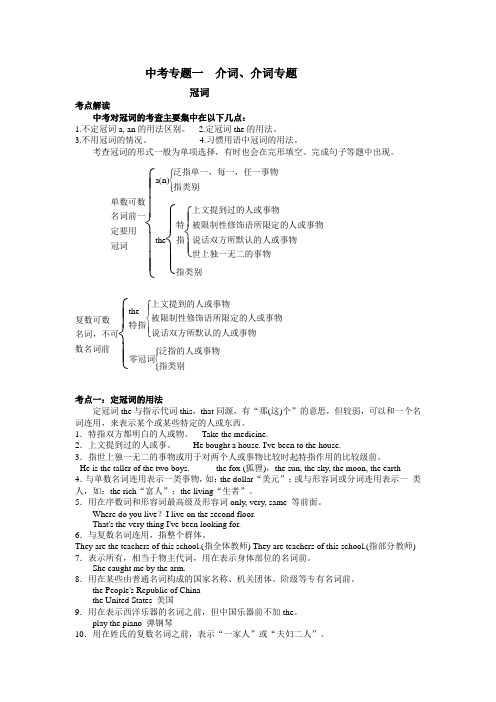
中考专题一 介词、介词专题冠词考点解读中考对冠词的考查主要集中在以下几点:1.不定冠词a, an 的用法区别。
2.定冠词the 的用法。
3.不用冠词的情况。
4.习惯用语中冠词的用法。
考查冠词的形式一般为单项选择,有时也会在完形填空、完成句子等题中出现。
单数可数名词前一定要用冠词⎩⎪⎪⎨⎪⎪⎧ a (n )⎩⎪⎨⎪⎧ 泛指单一,每一,任一事物指类别the ⎩⎪⎨⎪⎧ 特指⎩⎪⎨⎪⎧ 上文提到过的人或事物被限制性修饰语所限定的人或事物说话双方所默认的人或事物世上独一无二的事物指类别复数可数名词,不可数名词前⎩⎪⎨⎪⎧ the 特指⎩⎪⎨⎪⎧ 上文提到的人或事物被限制性修饰语所限定的人或事物说话双方所默认的人或事物零冠词⎩⎪⎨⎪⎧ 泛指的人或事物指类别考点一:定冠词的用法定冠词the 与指示代词this ,that 同源,有“那(这)个”的意思,但较弱,可以和一个名词连用,来表示某个或某些特定的人或东西。
1.特指双方都明白的人或物。
Take the medicine.2.上文提到过的人或事。
He bought a house. I've been to the house.3.指世上独一无二的事物或用于对两个人或事物比较时起特指作用的比较级前。
He is the taller of the two boys. the fox (狐狸),the sun, the sky, the moon, the earth4.与单数名词连用表示一类事物,如:the dollar “美元”;或与形容词或分词连用表示一 类人,如:the rich “富人”;the living “生者”。
5.用在序数词和形容词最高级及形容词only, very, same 等前面。
Where do you live ?I live on the second floor.That's the very thing I've been looking for.6.与复数名词连用,指整个群体。
- 1、下载文档前请自行甄别文档内容的完整性,平台不提供额外的编辑、内容补充、找答案等附加服务。
- 2、"仅部分预览"的文档,不可在线预览部分如存在完整性等问题,可反馈申请退款(可完整预览的文档不适用该条件!)。
- 3、如文档侵犯您的权益,请联系客服反馈,我们会尽快为您处理(人工客服工作时间:9:00-18:30)。
专题四:冠词中考研究冠词的考点常常分布在单选、完型中。
中考对冠词的考查主要集中在以下四点:1.冠词的基本用法2.不用冠词的情况3.习惯用语中冠词的使用和位置4.冠词与其他词性的词构成的一些固定短语一、不定冠词a/an的用法1.在叙述时第一次提到的人或物I want a pen pal in China.2.泛指某人或某物,有表示数量“一个”的意思。
It’s an action movie.3.用于表示时间,速度,价格等意义的名词之前,有“每一”的意思,相当于every。
two kilometers an hour 一小时两千米five lessons a week 一周五节课Most students exercise three or four times a week.每周三到四次Everyone needs to have at least eight hours’ sleep a night.每晚至少八个小时4.用在某些固定词组中a bit a little a lot (of) a few in a word a pair ofhave a cold in a hurry once upon a time make a faceafter a while have a try a number of have a good time a great manyhave/take a + 抽象名词have a swim have a walk have a look have a talk二、定冠词the 的用法1.表示双方都知道的人和事物I think she could get the job.Have you fed the dog and cleaned the room?2.表示特指的或上文已经提到过的人或事物。
Do you know the girl in red?3.表示世界上独一无二的事物。
The earth moves around the sun.4.用在序数词、形容词最高级前面,以及对两个人或事物进行比较时起特指作用的比较级前。
The best way to learn English is reading English magazines.The first lesson is very easy.5.用在姓氏的复数形式前表示一家人或夫妻俩。
The Greens are watching TV now.6.用在有普通名词构成的专有名词前。
the Great Wall the Summer Palace the Science Museum the United Nations联合国the United Kingdom大不列颠联合王国the United States美国the People’s Republic of China中华人民共和国7.用在某些形容词前,表示某一类人。
the rich/poor the sick/blind the old/young8.自然界中的一些地理名称前要加thethe Yellow River黄河the West Lake西湖the Great Lakes五大湖the Pacific太平洋the Atlantic大西洋9.与乐器连用,要加the。
Tom can play the piano well.10用在一些固定搭配中,要加the。
in the morning/afternoon/evening in the end on the right at the same timethe next morning at the back of in the front of all the year roundin the east/west/north/south look the same the next the last三、不用冠词(零冠词)的情况四、1.某些专有名词,如人名、地名、国名(只有一个词)、物质名词、抽象名词等表示泛指时前面不用冠词。
Mike is English, but he likes Beijing Opera.I really like his movie Rush Hour.China中国France法国Russia俄罗斯Brazil巴西2.名词前已有指示代词、不定代词或名词所有格等修饰时不用冠词。
Do you want to know about my morning?Every student likes English in our class.3.在节日、星期、日期、月份、季节等前面不用冠词。
It’s Tuesday, November 11.June 1st is Children’s Day.但如果节日中有festival,通常须加上冠词。
the Spring Festival春节Spring comes after winter. 但是in the fall特殊last+表示时间的名词不加冠词。
last Wednesday last century4.在称呼或表示头衔的名词前不用冠词。
This is Professor Li. Uncle Joe5.在三餐、球类运动,语言及学科名词前面不用冠词。
Let’s play ping-pong.I went to school without breakfast this morning.Do you like Math?Are you studying German? 但在表示语言的短语中有language时,须用冠词。
He is learning the French language.6.在与by连用的交通工具名称前不用冠词。
by car by train go to school by boat但是take a bus, in a boat, on the bike, in the car中需用冠词。
7.在某些固定词组或习惯用语中不用冠词day and night face to face side by side step by step watch TV in dangerat school/work/home in bed in time at noon/night/midnight/dawn on duty/watch8.量词之后的名词通常也不加冠词。
a bar of chocolate一块巧克力 a pair of shoes一双鞋9.固定短语。
in charge of负责for example例如in trouble陷入困境in fact实际上in danger处于危险中catch fire着火set fire to放火烧by hand手工的by machine用机器五、特别提醒:1.不定冠词a/an的区别a用在以辅音音素开头的单词前,an用在以元音音素开头的单词前,判断一个单词是元音开头还是辅音开头,要根据其读音,而不是根据首字母。
如:an honest boy,a useful book There is an “f” in the word “five”.在“five”中有字母“f”。
我们可以这样来记忆:不见元音不加an,不看字母看发音。
(1)在26个字母中,前面用an的字母有:a,e,f,h,i,l,m,n,o,r,s,x,其他用a。
(2)以u开头的单词,要注意区别。
如:an umbrella,an unusual story,an unhappy boy,a university,a useful book2. 有定冠词与无定冠词的区别(1)⎩⎪⎨⎪⎧ go to school 上学 是学生 go to the school 到学校去 不一定是学生(2)⎩⎪⎨⎪⎧ go to bed 就寝,上床睡觉go to the bed 向床边走去,走到床前不一定是去睡觉(3)⎩⎪⎨⎪⎧ in hospital 因病住院in the hospital 在医院里 不一定是病人 (4)⎩⎪⎨⎪⎧ at table 吃饭at the table 在桌子旁边 (5)⎩⎪⎨⎪⎧ at school 在上学at the school 在学校里 (6)⎩⎪⎨⎪⎧ in class 在上课in the class 在班级里(7)⎩⎪⎨⎪⎧ in future 今后in the future 将来 (8)⎩⎪⎨⎪⎧ in front of 在 ……外部的 前面in the front of 在 ……内部的 前面 (9)⎩⎪⎨⎪⎧ next year 明年the next year 第二年 (10)⎩⎪⎨⎪⎧ by sea 乘船by the sea 在海边 (11)⎩⎪⎨⎪⎧ in bed 睡、病、躺 在床上in the bed 某物 在床上 (12)⎩⎪⎨⎪⎧on earth 究竟on the earth 在地球上注:序数词前面用定冠词和不定冠词的区别the + 序数词表示“第一” eg: The cake is delicious, and I would like a second one.a/an + 序数词表示“又一,再一” eg: He won the first prize in the race.what 感叹句中:What an interesting book it is! 这是多么有趣的一本书啊!专题五:数词中考对数词的考查主要包括以下几个方面:1.掌握年、月、日、时刻的表达方法。
2.掌握基数词、序数词的构成及其用法。
3.分数的表达及主谓一致。
4.考查hundred,thousand,million,billion等词的用法。
表示数目多少或顺序先后的词叫做数词。
数词有两种:表示数目多少的叫做基数词,如:one,two,three...,ninety—four等;表示顺序先后的数词叫做序数词,如:first,second,third...,fifteenth等。
There are five people in my family. We live on the sixth floor in a tall building.我家有五口人。
我们住在一座高楼的第六层。
考点一基数词的表示方法1.基数词1~12是独立的词,13~19都是以teen结尾的词。
(1)1~12要逐个记:1.one/wʌn/2.two/tuː/3.three/θriː/4.four/fɔː/5.five/faIv/6.six/sIks/7.seven/'sevn/ 8.eight/eIt/ 9.nine/naIn/10.ten/ten/ 11.eleven/I ' levn/ 12.twelve/twelv/(2)13~19都以teen结尾,都是双重音:13.thirteen/,θɜː ' tiːn/14.fourteen/,fɔː' tiːn/ 15.fifteen/,fif' tiːn/16.sixteen/,siks' tiːn/17.seventeen/,sevn' tiːn/18.eighteen/,eI' tiːn/ 19.nineteen/,naIn' tiːn/2.基数词20~90整十位数都是以ty结尾。
